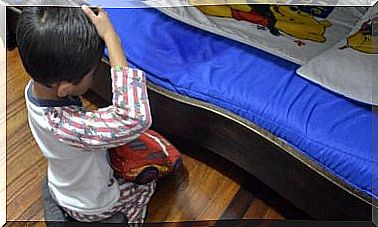My Son Is Afraid Of Everything: What Should I Do?

Is your child afraid of everything and you don’t know what to do about it? It is normal and very common for children to be afraid. It is even positive, as fear protects them from possible dangers, as long as they are not irrational. There are fears that are common to all children and that occur in an evolutionary way depending on age and, little by little, are overcome when the little ones receive help.
In this sense, worry should arise when fears last for a long time and, in addition, provoke a state of excessive anxiety.
In the following lines, we’ll tell you how you can help your child overcome these fears and how to encourage her to share her feelings and talk about her emotions. Parents often try to calm their children down when they are afraid, minimizing this feeling.
What happens is that, for the little ones, what they feel as threat and fear is real. Therefore, we must help them to manage those fears that, in the end, are an emotion that prepares them to defend themselves against dangerous or unknown situations or things.
Why is your child afraid?

It is very common for children to have different fears depending on their stage of development. Typically, as we mentioned, fears are evolutionary and change as their cognitive, emotional, and social characteristics change. These fears often disappear as children grow older.
Depending on their characteristics and experiences, there are children who experience these fears in different ways, or they may never experience a fear that often occurs in children of the same age.
For example, a child who has been attacked by a dog will not react in the same way as one who has had positive experiences with these animals. The first will be afraid and may even feel anxiety in the presence of a dog, while the other will not change.
Another issue is that some parents resort to instilling fear in their children to protect them from dangerous situations (strangers, animals, traffic, electrical outlets, etc.), but sometimes they also use it to control their children’s behavior. This educational practice occurs frequently, and a child may come to obey in the moment of fear, but in the long run he will have more serious problems. So pay attention!
What to do if your child is afraid?
When a child is scared and afraid very often, these are the recommendations that can be followed:
- Know what frightens her and talk to her so that she feels understood and heard. Explain that sometimes it’s okay to be afraid, but other times those fears have no real basis.
- Always show understanding and support. The child has to feel that the parents can help him to overcome this fear.
- Convey calm and security by maintaining a relaxed tone of voice.
- Teach her to overcome these moments of anxiety by using relaxation techniques, breathing techniques, listening to music, or doing any activity that keeps her busy.
- Rationally explain why she is out of harm’s way and show that her fear does not respond to any real situation, if any.
- Face the child’s fears together. If the fear is of dogs, it is advisable not to cross the street if you find one in your way. Try to act naturally, so your child will realize that this fear has no reason, because dogs don’t go around biting people in the street.
- Encourage the child to gradually face their fears with your help. When she has courageous behavior, give her praise.
- Be the example. Parents have to be a role model to improve the little ones. If they themselves are afraid of something, they must face the situation, just as they ask their child.
- Have the mood present. The best cure for fear is to turn the fearsome aspects of children into other funnier traits.
What shouldn’t you do?
It is inevitable that children are afraid of certain things, but if they can count on their parents’ patience and help, this fear will gradually disappear. It is important that the little one feels confident and knows that their parents or the people they are with will help them. Here’s what you shouldn’t do if your child is scared:

- Do not ignore or underestimate the child’s fears. If you do this, your child will feel disinterest in him as well as lack of attention and affection.
- Do not tell stories of ghosts, witches or other fantastic beings, especially before bed.
- Do not laugh at your fears, shame your children or make fun of them . If phrases like “Other kids your age aren’t that afraid” or “Aren’t you ashamed to be afraid of it?” are used, it will not reduce the fear. On the contrary, it will prevent the child from telling you their fears.
- Do not avoid the things that the child fears, because he can get over the fear at that time, but he will definitely not get over it.
- Do not give more importance than necessary. If your child is afraid of a dog and you step forward to show that you’re going to defend him, your child will understand that dogs are really dangerous and that you won’t help him overcome that fear.
- Don’t use the bed as a means of resolving your fear of the dark, for example.
- Do not force her to face her fear alone. If a child is afraid of the dark, don’t force him into the room alone if he doesn’t want to. Your anxiety will increase and that fear will become more resistant.
help if your child is scared
Fears are normal and evolutionary in little ones and tend to pass as they grow. If your child is afraid and you feel that this is disabling, causing excessive anxiety and having a significant impact on their life, in addition to following these tips, it is important to seek professional help. Then you can be given guidance to try to resolve this irrational fear.
Fear is an emotion that triggers a natural defense mechanism against the dangers we face. This is positive in certain situations so as not to endanger life. The problem arises when this fear has no real basis and causes significant discomfort in the person experiencing it.









